Author: E O’Donnell – Specialist in Special Care Dentistry
Disclaimer: This webpage does not replace personalised advice from your dentist and should be taken as general advice for keeping your mouth healthy. The information on this webpage will not apply to every person living with Cerebral Palsy. You should attend your dentist for individual advice.
This webpage will talk about how to look after your mouth, and common problems people living with cerebral palsy may come across.
Key Messages:
- Attend your dentist at least once every 1-2 years – your dentist will tell you how often you should come back.
- Brush your teeth with fluoride toothpaste daily – spit the toothpaste out but do not rinse with mouthwash or water.
- Try to reduce the sugar in your diet, snacking on tooth-friendly food like fruit and vegetables.
Keeping your mouth clean
How to find a dentist in Scotland:
Everyone should attend the dentist regularly. If you live in Scotland, you can find out how to register with an NHS dentist and access urgent dental care, here: Dental treatment | NHS inform
You may wish to consider registering with a local private dentist if there are no NHS dentists nearby.
Keeping your mouth clean:
Everyone should brush their teeth every day to stay healthy. Brushing helps to get rid of the bacteria and plaque (the white sticky stuff) that live on your teeth. This bacteria and plaque can cause holes (decay) in your teeth and swelling of your gums (gum disease) if not cleaned away regularly. Brushing your teeth helps to prevent decay, gum disease and mouth infections.
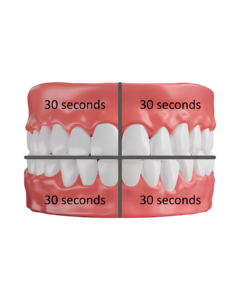 For most people, brushing twice a day for two minutes at a time is recommended. For some people, brushing for 2 minutes can be overwhelming or difficult. To help, you could instead break the recommended two minutes into smaller chunks of time. For example some people find it easier to brush, or have their teeth brushed for them, for 30 seconds four separate times a day instead, cleaning a different part of the mouth each time.
For most people, brushing twice a day for two minutes at a time is recommended. For some people, brushing for 2 minutes can be overwhelming or difficult. To help, you could instead break the recommended two minutes into smaller chunks of time. For example some people find it easier to brush, or have their teeth brushed for them, for 30 seconds four separate times a day instead, cleaning a different part of the mouth each time.
If brushing someone else’s teeth, it is useful to do so as part of a routine, at the same time every day. For instance, if they have a bath every day at 4pm, this may be a good time to brush their teeth as well, while they are relaxed. Try not to brush someone’s teeth when they are very tried, stressed, rushing out the door, or angry. Try to brush teeth in a quiet and calm environment. If someone does not want to brush their teeth at that time, don’t be afraid to come back and try again later. It might be helpful to make tooth brushing fun by turning it into a game.
If you want help brushing your own teeth, or are a family or support member wishing to help brush another person’s teeth this website: BrushMyTeeth is a great resource for videos and guides on how to brush.
Toothbrushes:
There are lots of different toothbrushes that can help to keep your mouth clean.
Normal toothbrushes (also known as manual toothbrushes) are easier to use and more effective when they have a small head with soft to medium bristles. In this picture you can see how the blue toothbrush (right) has a wider handle for better grip, and smaller head than the other yellow normal toothbrush (middle). The blue toothbrush is often easier to use because of its larger handle and smaller head.
Electric toothbrushes such as the white toothbrush in the picture (left), can be helpful in brushing teeth. Some have timers to help make sure you are brushing for long enough and some people like the gentle vibrations. A lot of dentist recommend electric toothbrushes
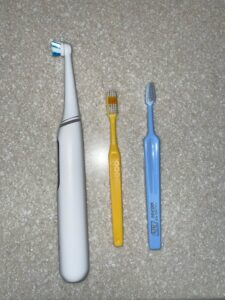
LHS: Electric toothbrush (left); manual toothbrush (middle) and small head manual toothbrush (right)
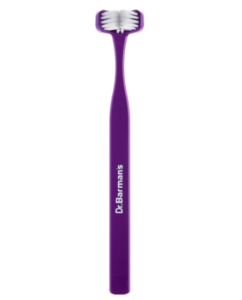 RHS Photo Credit: Dr Barman’s Superbrush Toothbrush Dental Direct| Buy Online
RHS Photo Credit: Dr Barman’s Superbrush Toothbrush Dental Direct| Buy Online
Other toothbrushes include Dr Barman’s toothbrush (purple toothbrush), a 3-sided toothbrush that is very good at removing the bacteria on your teeth when used by yourself or someone else helping to brush your teeth.
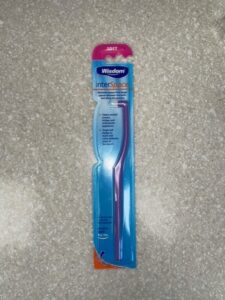
Sometimes your dentist or hygienist will recommend a single-tufted toothbrush for getting into to awkward corners of your mouth such as cleaning around wisdom teeth or teeth not fully through yet. These should be used in addition to your regular toothbrush, and not instead of.
Cleaning in between the teeth:
Everyone should be cleaning in between their teeth, also known as inter-dental cleaning. Toothbrushes alone cannot generally clean in between teeth well. There are many options for cleaning between teeth such as floss, flossette and TePe brushes. Your dentist can tell you which one suits your mouth best. Some people find cleaning between teeth tricky, so you may wish to try the long-handle version of TePe brush or flossette.
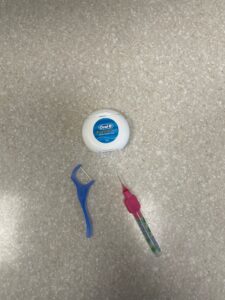
Picture: Floss (top), flossette (bottom left), interdental TePe brush (bottom right)
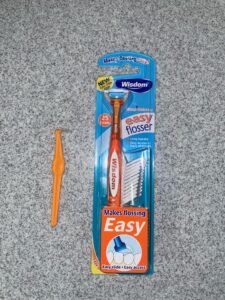
Picture: long-handle TePe Angle brush (left) and long handle flossette (right)
Top Tips for brushing your teeth:
- Aim to brush teeth for two minutes, twice a day.
- Brush with a fluoride toothpaste to help prevent decay.
- Do not wet your brush before applying toothpaste – this dilutes the toothpaste.
- Spit toothpaste out, but do not rinse with water or mouthwash afterwards – this dilutes the toothpaste.
- Have someone help with your brushing if you have weakness or poor control of your arm and hands movements.
Top Tips for a tooth healthy diet:
- Don’t eat too many foods and drinks that contain sugar.
- Tap water and plain milk are the only tooth friendly drinks that won’t damage your teeth.
- Consider watering down sugary drinks like fruit juices and diluting juices to reduce their sugar.
- Do not eat or drink (except tap water) after you brush your teeth at night.
- Fizzy drinks are acidic to teeth, and you should try to avoid them.
- Straws help reduce the damage of fizzy and sugary drinks to front teeth, but don’t protect the back teeth.
- Try to eat a health and balanced diet with lots of fruits and vegetables.
- Consider swapping sugar in tea and coffee for sweeteners.
Oral health and living with cerebral palsy
While cerebral palsy does not directly affect the health of your mouth, there may be conditions related to cerebral palsy that can lead to poorer dental health.
Getting to the dentist and being comfortable for treatment:
Getting into the dental clinic can be tricky if there are steps or you use mobility aids such as wheelchairs. Most people will be able to attend their regular dentist for treatment, although some might be referred to Special Care Dentistry and the Public Dental Service if they have specific needs. You cannot self-refer to these and must have a check-up with your regular dentist first, who will decide if you need referred.
If you use a wheelchair, some dentists may use a wheelchair tipper to treat while you are in your chair. Others may use hoists to move you from your chair into the dental chair. It is useful to make your dentist aware of what type of sling you use, if you use a hoist.
Sometimes it is helpful to use pillows to support your body in the dental chair, so that you find it comfortable.
People may struggle keeping their mouth open for dental treatment or tooth brushing, Your dentist may recommend a device that you can rest your teeth on which keeps your mouth open, and you and the dentist stay safe. Examples of these are the Open Wide Mouth Rest (left) or Bedi Shield Oral Guard (right)
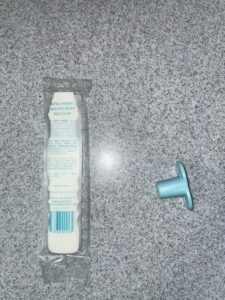
Dental decay and gum disease:
People with cerebral palsy may be at an increased risk of having both dental decay and gum disease. This is generally because of finding tooth brushing difficult, or relying on another person to brush your teeth for you. Diets high in sugary food and drinks also increase the risk of decay. Some people may be breathe mostly through their mouth rather than their nose. This can cause a dry mouth, where the lack of protective saliva can lead to inflamed or sore gums. Some medications, including certain ones taken for epilepsy, may lead to your gum overgrowing (known as gingival hyperplasia).
Some people with cerebral palsy has misaligned teeth (also known as malocclusion.) Teeth may look crowded, be of different size and shape or be in a different position. If you have good mouth cleaning, misaligned teeth should not cause problems, however they are often more difficult to keep clean which could lead to decay and gum disease.
Difficulty Swallowing:
Some people have difficulty swallowing foods and liquids. This is known as dysphagia. The dentist has to be careful so that any water they use while doing cleaning or fillings is quickly suctioned away. Sometimes it is not safe for the dentist to use water in your mouth, if you have dysphagia. This may limit the number of dental treatments available to you. Dentists may use a device called rubber dam or gauze to protect your throat while they are working. Your dentist may recommend that you use SLS-free toothpaste which does not foam or bubble like a regular toothpaste if you have swallowing issues. These toothpastes can sometimes be safer for those with an unsafe swallow. Some SLS-free toothpaste do not have fluoride which makes them less effective. Some examples of brands that are free of SLS but contain fluoride includes:
| Sensodyne Proenamel |
| OraNurse 1450ppm fluoride |
| BioXtra Dry Mouth Toothpaste 1500ppm |
| Oralieve Ultra Mild Toothpaste for dry mouth (1450ppm) |
List of SLS-free fluoridated toothpastes
Correct as of January 2025 and cannot be guaranteed after this date
When brushing the teeth of someone with swallowing issues, they should be sitting up with their chin lowered. Regular mouth cleaning will lower the risk of food, bacteria and debris from the mouth going down into the lungs – called aspiration. Aspiration is very serious and people with dysphagia can be at higher risk of this. Your dentist will recommend the best way to clean your mouth, but using a non-foaming toothpaste on a dry small-headed toothbrush if generally recommended. Use a damp non-fraying cloth or gauze to remove excess toothpaste and debris after, if you cannot spit.
Wearing down your teeth:
Teeth can be worn down over time if you clench them together or grind them. This can overnight while you are asleep or during the day. Sometimes people with movement disorders have increased risk of worn teeth. Tooth wear can be very difficult to treat and your dentist may recommend they make you a custom mouth guard.
Teeth can also be worn down if the mouth is acidic. This might be if you drink a lot of acidic fizzy drinks, eat or drink a lot of citrus fruits (e.g. lemon) or have reflux (heart burn) where the acid from your stomach comes up to your mouth. If you have reflux, your dentist may recommend you see your GP for medicine to help prevent this. You should try to avoid fizzy drinks and acidic foods if you have tooth wear.
Gagging:
Some people may have a more sensitive gag reflex when having their teeth brushed or when visiting the dentist for treatment. Having an appointment early in the day, before eating breakfast can be useful. Often distraction with music, fidget toys and stress balls can be useful as well as doing breathing exercises. Occasionally your dentist may recommend medicine to help to relax you such as in intra-venous sedation with Midazolam or being put to sleep for treatment with a general anaesthetic.
Anxiety:
Like the rest of the population, people living with cerebral palsy may be anxious about attending the dentist or getting dental treatment. It is important that you attend your dentist regularly to build up your relationship with them, and trust. Seeing your dentist regularly will mean they can spot dental problems early, while they are smaller and easier to fix. Your dentist may be able to provide sedation for you, but this is not always possible for everyone.
Top Tip: If you are nervous or anxious at this dentist, it is a good idea to let them know. They can work with you to build your confidence and make sure you are comfortable.
Drooling:
Occasionally, patients living with cerebral palsy may find themselves drooling. This can be due to head position if your head is regularly tilted forward; caused by medicines you are taking; or a sign of difficulty with swallowing. Saliva is very good for your mouth and it can be tricky to prevent drooling. In extreme cases some patients qualify for medicines called anticholinergics, or injection of Botox into your saliva glands to help reduce drooling. This is not always recommended as reducing your saliva can increase your risk of decay and gum disease.
References:
practical-oral-care-cerebral-palsy.pdf
Oral Health, Dental Visits and Dentist | CerebralPalsy.OrgCerebralPalsy.org
Cerebral Palsy and Oral Health Issues | Cerebral Palsy Guidance
sdcep-prevention-and-management-of-dental-caries-in-children-guidance-in-brief-2nd-edition.pdf
Dysphagia and Oral Healthcare | mouth-care
